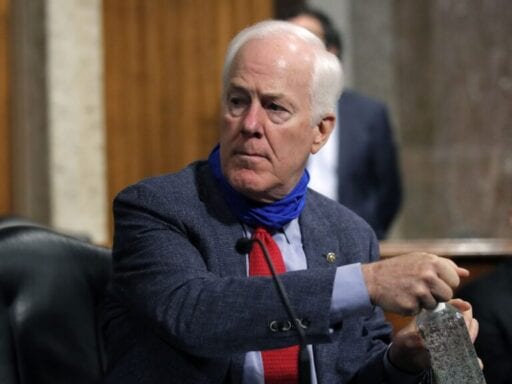He’s the latest Republican to question the existence of system racism in policing.
Sen. John Cornyn (R-TX), during a Senate Judiciary hearing about police violence on Tuesday, became the latest official to struggle to grasp the existence of systemic racism in the US — an issue that became clear during his questioning of a panel of witnesses.
“I would like the witnesses to tell us if they believe that the police department and the police in America are systemically racist,” Cornyn said. “Would anybody like to raise their hand agreeing with that statement?”
At that point, multiple witnesses who were testifying appeared to raise their hands, which prompted Cornyn to follow up with another question. “And that means all 18,000 police departments, all 800,000 law enforcement officers? Is that true?”
Witnesses including S. Lee Merritt, an attorney representing George Floyd’s family, emphasized that the nature of systemic racism is less about individual actors and more about how policing is structured throughout the country. “When we overconcentrate our … black and brown communities, specifically, with militarized policing, what you’re going to have is disproportionate use of force and incarceration of black and brown people,” Merritt said.
As Vox’s German Lopez has previously explained, such racism is pervasive because it’s shaped by “enormous cultural and systemic forces” that affect how police perceive different people based on race — and it goes far beyond any one individual’s biases:
Racial bias isn’t necessarily about how a person views himself in terms of race, but how he views others in terms of race, particularly in different roles throughout his everyday life. And systemic racism, which has been part of the US since its founding, can corrupt anyone’s view of minorities in America.
In the case of police, all cops are dealing with enormous cultural and systemic forces that build racial bias against minority groups. Even if a black cop doesn’t view himself as racist, the way policing is done in the US is racially skewed — by, for example, targeting high-crime neighborhoods that are predominantly black.
Cornyn, however, struggled to accept that these biases aren’t limited to specific individuals.
“You think systemic or structural racism can exist in a system that requires individual responsibility?” he went on to ask, “Or do you think it’s one or the other.”
“I think every American institution has been shaped by these forces,” said Vanita Gupta, the president of the Leadership Conference on Civil and Human Rights.
“Do you believe that, basically, all Americans are racist?” Cornyn said.
“I think we all have implicit bias and racial bias, yes, I do,” Gupta responded. “Wow,” Cornyn said. “You lost me when you want to take the acts of a few misguided, perhaps malicious, individuals, and ascribe that to all Americans.”
You can watch the full exchange, here.
Cornyn isn’t the first Republican official to struggle with the acknowledgment of systemic racism: Last week, Attorney General Bill Barr said he didn’t believe it existed within the United States’ law enforcement system. (The Washington Post’s Radley Balko has compiled a list of studies examining racial bias in policing. The list shows, among many disparities, that black people are more likely than white people to be searched during traffic stops and that black men have been roughly 2.5 times more likely than white men to be killed by police.)
The hearing, which centered on examining the reforms that Congress could pass to address police killings of black Americans and disproportionate use of force by law enforcement, highlighted how Republicans — including Chair Lindsey Graham — were seemingly eager to take action in response to police brutality but simultaneously unwilling to acknowledge the full scope of the problem.
Graham, for example, repeatedly expressed reservations about “qualified immunity” — a legal provision that makes it more difficult to sue police officers for misconduct, but he was wary of adding undue financial burden on officers who face such suits.
Support Vox’s explanatory journalism
Every day at Vox, we aim to answer your most important questions and provide you, and our audience around the world, with information that has the power to save lives. Our mission has never been more vital than it is in this moment: to empower you through understanding. Vox’s work is reaching more people than ever, but our distinctive brand of explanatory journalism takes resources — particularly during a pandemic and an economic downturn. Your financial contribution will not constitute a donation, but it will enable our staff to continue to offer free articles, videos, and podcasts at the quality and volume that this moment requires. Please consider making a contribution to Vox today.
Author: Li Zhou
Read More



